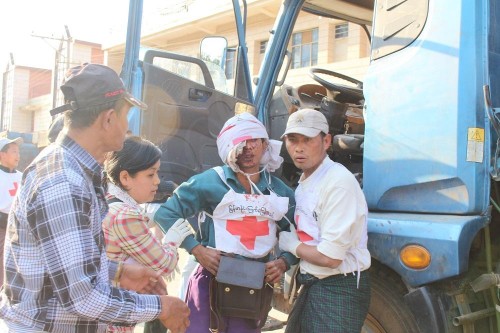Amnesty International has slammed the attack on a Red Cross convoy near Kunlong in Shan State as “unacceptable” and noted that, as an intentional attack on humanitarian personnel, the incident may constitute a war crime.
“Any attack on humanitarian relief personnel is completely unacceptable,” said Olof Blomqvist, the Asia-Pacific press officer for Amnesty International. “These organisations must be able to carry out their crucial lifesaving work without the fear of violence hanging over them. Countless people rely on the work of these organizations for their survival – civilians are already bearing the brunt of reported human rights abuses by all sides in the conflicts in northern Myanmar [Burma].
“Intentional attacks on humanitarian relief personnel are strictly prohibited under international law, and may amount to war crimes. Those responsible for the attack on the Myanmar Red Cross staff must be brought to justice and tried in accordance with international law and standards.”
The comments, made exclusively to DVB, come after a Myanmar Red Cross convoy transporting refugees out of Laogai [also spelt Laukkai] came under attack, leaving two aid workers injured.
[related]
No group has taken responsibility for the attack, which was recorded by a DVB reporter who was in a Red Cross truck as it came under gunfire. However, the area in question, Parsi, was the scene of clashes in previous days between Burmese government forces and Kokang rebels. The Burmese army’s 128th Infantry Battalion subsequently took up positions in the surrounding hills.
In addition to DVB’s reporter Hkun Zaw Oo, other journalists were travelling in trucks with the convoy, including photojournalists from EPA, The Irrawaddy and Reuters. Myanmar Journalist Network (MJN) on Wednesday called on the Burmese government to ensure the safety of reporters covering the conflict in Laogai, and urged journalists working in the area “to proceed with caution”.
The United Nations’ Resident and Humanitarian Coordinator in Burma, Renata Dessallien, said she was “saddened” by news of the attack on the Red Cross convoy.
“I am saddened to hear of the attack on a Myanmar Red Cross Society convoy en route between Laukkai and Chinshwehaw in northern Shan State on 17 February,” she said. “ … An attack on humanitarian aid workers and on civilians is a violation of international humanitarian law. I call on all parties to the conflict to ensure the safety and security of humanitarian staff and remind them of their obligations under international humanitarian law, and to allow humanitarian convoys safe passage out of the conflict area.”
She also called on all warring parties to ensure that civilians are protected, and to allow civilians who remain in the conflict zone safe passage out of the Kokang area.
The Myanmar Red Cross, the International Committee of the Red Cross, and the International Federation of Red Cross and Red Crescent Societies on Wednesday released a joint statement, saying it “deplores” the attack in which two of its volunteers were injured.
It confirmed that the eight-vehicle convoy was marked with the Red Cross emblem, and was evacuating civilians displaced by fighting in the Kokang region of northern Shan state.
Prof. Tha Hla Shwe, president of the Myanmar Red Cross, said: “It is very sad to hear that our Red Cross volunteers were wounded while carrying out a strictly humanitarian function to help the victims of this fighting. The volunteers and convoy were marked with the protective Red Cross emblem. They should be respected and not be the object of attack.”
The joint statement called on all parties to “respect the work of the Red Cross and guarantee the safety of aid workers and their unimpeded, immediate access to people in need of humanitarian assistance.”
It further urged all parties “to spare all civilians and refrain from targeting civilian areas.”
In an interview with Agence France-Presse (AFP), Tun Tun Oo, head of the Lashio Red Cross, said it was now too dangerous to go into Laogai.
“We just have to wait for people to come to us. If the army could give us protection under military rule, then we would go back,” he told AFP.
Tens of thousands of civilians have fled the Kokang capital and are now mostly being sheltered in Nansan on the Chinese side of the border, or in Lashio in central Shan State.
President Thein Sein on Wednesday signed into effect a 90-day state of emergency in the Kokang area, and conferred executive and judicial powers to the commander-in-chief of the defence services.
State media warned on Thursday that under the terms of martial law, courts may be administered under summary proceedings with powers to hand down death sentences and unlimited jail sentences for crimes such as high treason, murder, rape, manslaughter, robbery and corruption.



